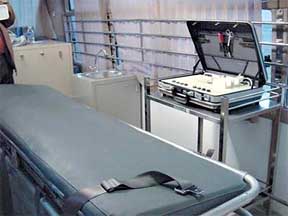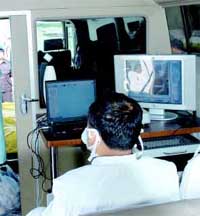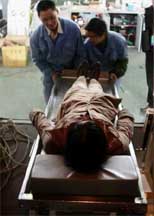Tribunal panel member Regina Paulose (L), chair to the tribunal Sir Geoffrey Nice QC (C), and panel member Nicholas Vetch on the first day of the April hearings in London on April 6, 2019. (endtransplantabuse.org)
Forced Organ Harvesting in China Has Taken Place ‘On Significant Scale,’ Independent Tribunal Finds
June 17, 2019
 Image: Former surgeon Enver Tohti who used to participate in forced organ harvesting and deeply regrets it.
Image: Former surgeon Enver Tohti who used to participate in forced organ harvesting and deeply regrets it. 
Organ Harvesting Bus



An independent people’s tribunal has unanimously concluded that prisoners of conscience have been—and continue to be—killed in China for their organs “on a significant scale,” after a year-long investigation.
“Forced organ harvesting has been committed for years throughout China on a significant scale,” said chair of the tribunal, Sir Geoffrey Nice QC in a judgment delivered on June 17 in London.
The panel further concluded that adherents of the banned spiritual practice Falun Gong have been one of the main sources of organ supply. Falun Gong, a spiritual discipline consisting of meditation exercises and moral teachings based on truthfulness, compassion, and tolerance, has been brutally persecuted by the Chinese regime for the past two decades. Adherents of the practice have been thrown into prisons, labor camps, and brainwashing centers, where many have been tortured in an effort to force them to renounce their faith.
“The Tribunal has had no evidence that the significant infrastructure associated with China’s transplantation industry has been dismantled—and absent a satisfactory explanation as to the source of readily available organs—concludes that forced organ harvesting continues till today,” he added.
Chaired by Nice, who previously led the prosecution of former Yugoslavian President Slobodan Milosevic at the International Criminal Tribunal, the panel consists of seven international experts tasked with conducting the world’s first ever independent analysis of forced organ extraction in China.
The tribunal also found, beyond reasonable doubt, that crimes against humanity have been committed against Falun Gong practitioners and Uyghur Muslims in China.
Nice said the tribunal reached these conclusions after considering all the evidence available to it, including testimony from more than 50 witnesses given at two hearings.
He added that the tribunal reached out to representatives of the Chinese regime, including the Chinese embassy in London and health officials, but did not hear back from them. The tribunal, he said, did not use the regime’s silence as evidence against it in reaching its conclusions.
Organ Harvesting
For the past 12 months, the tribunal has been investigating whether crimes have been, and continue to be, committed by the Chinese regime in relation to the practice of forcibly extracting organs from living prisoners of conscience for transplant surgery and profit—known as forced organ harvesting.
“Forced organ harvesting is of unmatched wickedness—on a death for death basis—with the killings by mass crimes committed in the last century,” Nice said.
Detailed reports of the disturbing practice first emerged in 2006. Investigators concluded that the rapid expansion of China’s organ transplantsector since the year 2000 could be explained by the forcible extraction of organs from prisoners of conscience, primarily from Falun Gong practitioners.
Last December after the first set of hearings, the tribunal members passed a draft interim judgment concluding that forced organ harvesting from prisoners of conscience has taken place in China “on a substantial scale.”
Findings
Nice said the tribunal made a series of findings regarding the organ transplant system in China that led it to reach the “unavoidable” final conclusion that organ harvesting is taking place in the country.
He said the tribunal received a “a great deal of evidence” showing that wait times for organs promised by doctors and hospitals in China for transplantation were extraordinarily short—timeframes not possible under normal voluntary organ donation systems. The evidence included undercover phone calls to Chinese doctors, as well as testimony from an Israeli doctor who recounted how his patient was told he could receive a heart transplant in two weeks.
The statistical evidence, Nice said, also revealed that the number of transplants performed did not match the numbers provided by China’s voluntary donor system.
Nice said that based on analysis of infrastructure and capacity at 146 Chinese hospitals, a conservative estimate is that 60,000 to 90,000 transplant operations are conducted each year—vastly greater than the figures suggested by the Chinese regime of 10,000 to 20,000 per year.
The tribunal also received consistent evidence from survivors that they were medically tested, including blood tested, while incarcerated. These tests were consistent with testing for organ status, Nice said.
He noted that the tests seemed particularly out of place because the subjects were also tortured while detained. The results of the tests were also never explained to the victim, he added.
The tribunal also received direct evidence of organ harvesting, Nice said, including from a former surgeon who was instructed to perform organ extractions at a time when the industry was just beginning to grow.
Enver Tohti, during the December hearings, recounted how he performed surgery on a death-row prisoner who had been shot in his right chest but was still alive.
“What I recall is with my scalpel, I tried to cut into his skin, there was blood to be seen. That indicates that the heart was still beating… At the same time, he was trying to resist my insertion, but he was too weak,” he said.
Call to Action
While the tribunal concluded that the evidence showed that the Chinese regime had committed crimes against humanity, it found that it could not be certain if it committed the crime of genocide as defined under international law, because it could not prove the intent element of this crime.
The tribunal, in its judgment, nevertheless noted that “there is justifiable belief in the minds of some or many—rising to probability or high probability—that genocide has been committed.”
The tribunal said that governments and international bodies “must do their duty” in relation to the findings that the regime has committed crimes against humanity. It added that “there is a duty on those who have the power to institute investigations for, and proceedings at, international courts or at the U.N. to test whether genocide has been committed.”
Failing that, the tribunal urged citizens to act jointly to pressure governments “so that those government and international bodies are unable not to act.”
Finally, the tribunal noted that governments and those interacting with the Chinese regime, including doctors, medical establishments, businesses, and educational institutions, “should now recognize that they are, to the extent revealed [in the judgment], interacting with a criminal state.”
Susie Hughes, executive director and co-founder of the transplant ethics group, The International Coalition to End Transplant Abuse in China (ETAC), in a statement, called for an urgent response to end the horrendous crimes.
“It is no longer a question of whether organ harvesting in China is happening, that dialogue is well and truly over. We need an urgent response to save these people’s lives,” Hughes said.
“To that end, we must hold China to account for its crimes against humanity, immediately stop all transplant related collaboration with China, and prevent our own citizens from participating in transplant tourism to China.”
Annie Yang, who was one of several Falun Gong practitioners to give testimony of being tortured and medically tested while detained for her beliefs, told The Epoch Time’s sister media NTD that the judgment was a significant development that could be used to compel people and governments to take action.
“People need to courage to speak out, to talk about it, to let people know,” Yang said. “Only this way, can you stop this persecution, to stop this organ harvesting, to stop this crime.”

No comments:
Post a Comment
Comments always welcome!